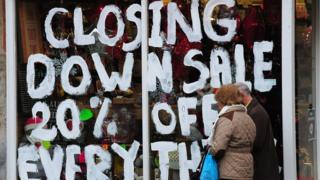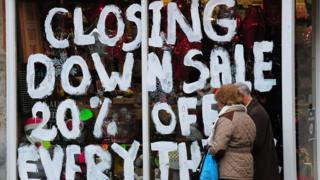‘Almost 10,000’ retail jobs lost this year
Tough competition on the UK High Street means there are more job losses to come, say insolvency specialists. …

 Image copyright PA Media
Image copyright PA Media There have been almost 10,000 retail job losses in the UK so far in 2020, according to retail sector analysts, with more failures forecast.
In total, 9,949 jobs have gone, said the Centre for Retail Research (CRR).
A further 1,200 jobs are under threat with the collapse of Beales and Hawkin’s Bazaar last week.
“We’re going to see more retail failures this year,” said Julie Palmer, a partner at insolvency specialists Begbies Traynor.
“January is traditionally a really bad month for retailers and if retailers have not had a good Christmas, they will really struggle, particularly at the end of January when the quarterly rent bill is due.”
The UK retail sector employs about three million people, so the latest losses would mean that one job in 300 has disappeared this year so far. According to the CRR, the sector lost 143,100 jobs during 2019.
Earlier this month, the British Retail Consortium (BRC) said total retail sales fell for the first time in 25 years in 2019. Sales in November and December were particularly weak, falling 0.9%.
Several retailers have announced store closures and redundancies this month already, after deep discounting and disappointing sales, among them Asda, Debenhams, HMV, Game and Topshop owner Arcadia.
Household name Mothercare has now shut its UK shops for good, while 139-year-old department store chain Beales and toy shop Hawkin’s Bazaar have collapsed into administration.
The decline of the British High Street has been widely documented, and while high business rates, national living wage rises, Brexit and weak consumer confidence are acknowledged challenges facing retailers, most of the blame is attributed to the rise of online retail.
But the online sector is also facing serious challenges, according to Ms Palmer.
“There’s a lot of competition from new start-ups online, and it’s difficult for online retailers to position their brand properly unless they pay for a lot of pay-per-click ads,” said Ms Palmer.
While online-only fast fashion brand Boohoo has overtaken High Street stalwart Marks and Spencer in terms of market capitalisation, Asos, another online seller, issued profit warnings in 2018 and 2019. Sales growth rose in the most recent quarter, but the battle for consumers is as fierce online as off.
“The High Street has settled down a little bit. What we’re seeing is the new norm and we’re going to see more failures online,” said Ms Palmer.
The increased competition is likely to lead to a transformation of the UK’s town centres, including the demise of many department stores and the return of smaller shops, according to Ms Palmer.
“[Town] planners are being more imaginative about how they plan High Streets.
“Developers like McCarthy and Stone and Churchill’s are working on a lot of housing projects and some of that retail space is going over to elderly accommodation for the over-55s, who like living in smaller city centres,” said Ms Palmer.
“Older shoppers don’t want big department stores – they want the retailer to have a focus on the local community.”



